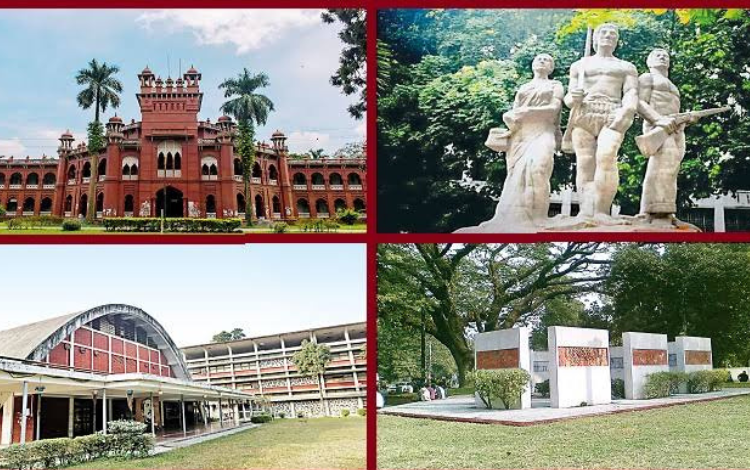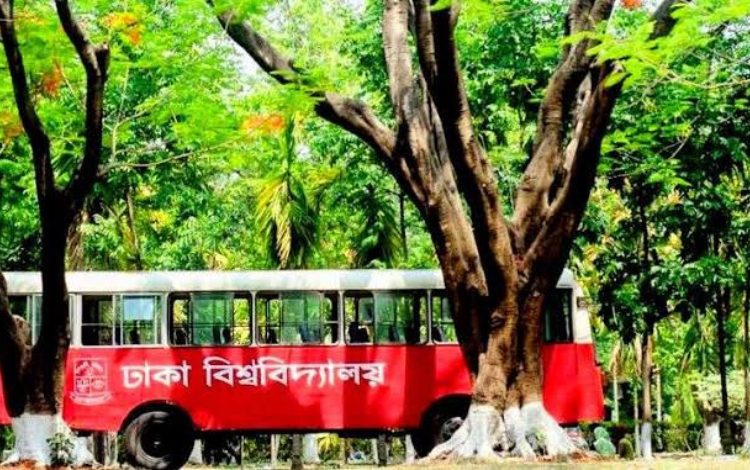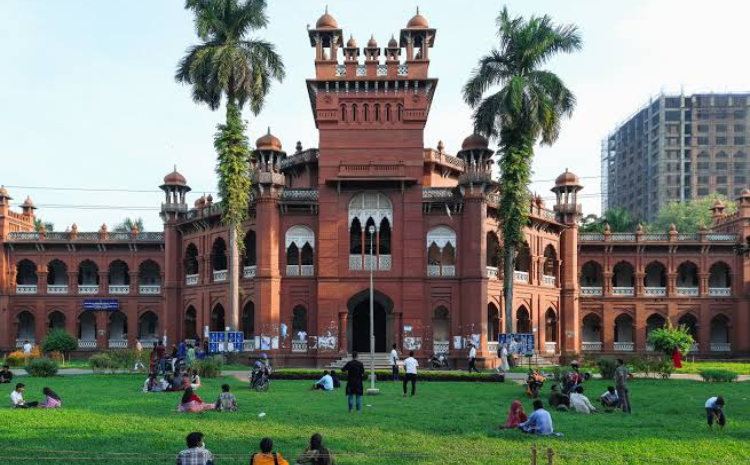Dhaka University: A Chronicle of Academic Excellence and National Pride
Dhaka University, nestled in the heart of the bustling capital city of Bangladesh, stands as an enduring testament to the nation’s thirst for knowledge, intellectual vigor, and unwavering determination. Established in 1921, this venerable institution has woven itself into the very fabric of Bangladesh’s history, evolving over nearly a century to become a beacon of academic excellence, social progress, and cultural heritage.
Foundation and Early Years (1921-1947)
The origins of Dhaka University can be traced back to a time when the Indian subcontinent was under British colonial rule. In the early 20th century, there was a pressing need for an institution of higher learning in East Bengal (now Bangladesh) to cater to the intellectual aspirations of the local populace. Responding to this need, Dhaka University was founded on July 1, 1921. Its establishment marked a significant milestone, not just in the educational landscape of the region, but also in the collective consciousness of the people. The inauguration, graced by luminaries like Lord Hardinge, the then Viceroy of India, and Rabindranath Tagore, the celebrated poet, signaled the birth of an institution that would shape the destiny of countless individuals.
During its early years, Dhaka University emerged as a center of intellectual and cultural ferment. It became a hub for academic pursuits, fostering a spirit of inquiry and critical thinking among its students. The university’s sprawling campus, adorned with architectural marvels, became a melting pot of ideas, nurturing the intellectual curiosity of scholars and students alike. Under the tutelage of renowned academics, the university began to carve its niche in various fields of study.
The 1947 partition of India had a profound impact on Dhaka University. The partition divided Bengal along religious lines, leading to the creation of East Pakistan as part of the newly formed Islamic state of Pakistan. Dhaka University, located in East Pakistan, became a symbol of Bengali identity and cultural heritage. Despite the political challenges that arose in the wake of partition, the university remained steadfast in its commitment to education and knowledge dissemination.
Role in Independence and Liberation (1947-1971)
The period following the partition witnessed a surge in political activism and social change. Dhaka University became a breeding ground for nationalist movements, advocating for the rights of the Bengali-speaking population within the larger framework of Pakistan. The university’s students and faculty actively participated in political debates and social reform initiatives, shaping the socio-political landscape of East Pakistan.
The year 1971 holds an indelible mark in Dhaka University’s history. It was during this year that Bangladesh, led by its fierce struggle for independence, emerged as a sovereign nation. The university played a pivotal role in the Liberation War against Pakistan. The campus became a focal point of resistance, echoing with the voices of students and intellectuals demanding freedom and justice. Tragically, the struggle for independence exacted a heavy toll on the university community; many students, faculty members, and staff lost their lives in the fight for liberation. Their sacrifices stand as a testament to the resilience and courage of the people of Bangladesh.

Post-Independence Renaissance (1971-Present)
In the aftermath of independence, Dhaka University embarked on a journey of rebuilding and renewal. The challenges were immense, but the spirit of the university community remained unbroken. The institution’s role as a center of learning and research gained further prominence in the newly independent Bangladesh. It became a symbol of the nation’s resilience, embodying the spirit of a young, democratic, and progressive country.
Dhaka University diversified its academic offerings, expanding its faculties and departments to encompass a wide array of disciplines. The university’s commitment to academic excellence led to the establishment of research centers, laboratories, and libraries, fostering an environment conducive to learning and innovation. Moreover, the university prioritized inclusivity, welcoming students from diverse backgrounds and communities, enriching the academic discourse with varied perspectives.
Over the years, Dhaka University’s alumni have made significant contributions to various fields. Many graduates have excelled in politics, literature, science, arts, and social activism, both nationally and internationally. Their achievements have added luster to the university’s reputation, highlighting its role in nurturing leaders and visionaries.
In the contemporary era, Dhaka University has embraced technological advancements and pedagogical innovations. The integration of modern technology into the learning process has enhanced the university’s educational offerings, enabling students to engage with cutting-edge research and global developments. The university’s faculty members have garnered international recognition for their research endeavors, further establishing Dhaka University as a hub for scholarly pursuits.
Furthermore, Dhaka University has actively fostered collaborations with international institutions, promoting academic exchange and cross-cultural understanding. These partnerships have facilitated student and faculty exchanges, collaborative research projects, and joint academic programs, enriching the university’s global perspective.
Challenges and Triumphs
Dhaka University has not been immune to challenges. Political unrest, demands for reforms, and occasional periods of turbulence have tested the resilience of the institution. However, each challenge has been met with fortitude and a commitment to uphold the values of education and academic freedom.
The university’s triumphs have far outweighed its tribulations. Its ability to adapt, innovate, and evolve has allowed it to maintain its status as a prestigious institution of higher learning. The diverse and vibrant student body, coupled with the dedication of its faculty and staff, has created an environment where intellectual curiosity thrives and scholarly pursuits flourish.

Conclusion
Dhaka University’s history is a chronicle of resilience, fortitude, and intellectual pursuit. From its humble beginnings in the early 20th century to its current status as a leading academic institution, it has weathered numerous storms and emerged stronger. Its legacy is not just in the buildings and books that adorn its campus but in the minds and hearts of the countless individuals it has educated and inspired.
As Dhaka University continues to march forward into the 21st century, it does so with a sense of purpose and pride. Its commitment to shaping the future leaders of Bangladesh and the world remains unwavering. The echoes of its past struggles and triumphs serve as a reminder of the enduring power of education and the pivotal role institutions like Dhaka University play in shaping the destiny of nations. In the annals of Bangladesh’s history, Dhaka University stands tall, an eternal flame of knowledge illuminating the path to a brighter tomorrow.
Writer
Md Ashikur Rahman
Senior Executive, Content Writing Department
Requin BD





88 Comments
Dijital telif hakları
August 29, 2024
Dijital telif hakları SEO optimizasyonu ile web sitemiz daha fazla ziyaretçi çekmeye başladı. https://www.royalelektrik.com/sahintepe-elektrikci/
başakşehir elektrikçi
September 1, 2024
başakşehir elektrikçi SEO optimizasyonu, web sitemizin trafiğini büyük ölçüde artırdı. https://www.royalelektrik.com/
beykoz elektrikçi
September 5, 2024
beykoz elektrikçi SEO optimizasyonu, dijital pazarlama hedeflerimize ulaşmamıza yardımcı oldu. http://www.royalelektrik.com/
PutawKii88
September 9, 2024
Vidio Bocil 18+ Bokep
chartersolutions.org
September 9, 2024
Link paling hoky saat ini hanya ada di https://chartersolutions.org/
beşiktaş elektrikçi
September 9, 2024
beşiktaş elektrikçi Google SEO ile online varlığımızı güçlendirdik. https://www.royalelektrik.com/
116ingoi88.shop
September 9, 2024
Situs penyedia video orang bocil saat ini bokep jepang
güngören elektrikçi
September 21, 2024
güngören elektrikçi SEO uzmanları ile çalışmak, Google sıralamalarında hızlı bir yükseliş sağladı. http://www.royalelektrik.com/
mpo11
September 22, 2024
MPO11 adalah situs slot gacor 2024 gampang menang yang memiliki permainan terlengkap & bocoran slot gacor hari ini.
Anında takipçi
October 4, 2024
Anında takipçi SEO optimizasyonu ile arama motorlarında daha fazla görünürlük elde ettik. https://www.royalelektrik.com//esenyurt-elektrikci/
Takipçi hedefleme
October 6, 2024
Takipçi hedefleme SEO optimizasyonu, web sitemizin performansını inanılmaz derecede artırdı. https://royalelektrik.com//beylikduzu-elektrikci/
Üsküdar profesyonel gider açma
October 10, 2024
Üsküdar profesyonel gider açma Üsküdar de hizmet veren bir acil vidanjör ve tıkanıklık açma firmasıdır. Firmamızın ana faaliyeti kanalizasyon, yağmur suyu gibi pek çok hizmet sunmaktayız. https://fijianvibe.com/blogs/1300/%C3%9Csk%C3%BCdar-kanal-t%C4%B1kan%C4%B1kl%C4%B1%C4%9F%C4%B1-a%C3%A7ma
Üsküdar gider açma makineleri
October 13, 2024
Üsküdar gider açma makineleri Kanalizasyon borularımız tıkandığında, bu firma ile iletişime geçtik ve gerçekten etkilendik. Hızlı cevapları ve kaliteli hizmetleri sayesinde sorunumuz kısa sürede çözüldü.Teşekkürler! https://netbook.com.ng/read-blog/9749
Üsküdar su kaçak tamirci
October 16, 2024
Üsküdar su kaçak tamirci Üsküdar su kaçağı tespiti hizmetinde termal kamera ve dinleme cihazları kullanarak kaçağı noktasal olarak tespit ediyoruz. https://shareyoursocial.com/read-blog/40433
Su kaçak tespiti Üsküdar
October 19, 2024
Su kaçak tespiti Üsküdar Hızlı ve kaliteli bir servis, su kaçağı sorunumu anında çözdüler. https://saopaulofansclub.com/read-blog/5431
Üsküdar tıkanıklık açma
October 20, 2024
Üsküdar tıkanıklık açma Evdeki su kaçağı canınızı mı sıkıyor? Üsküdar su kaçağı tespiti ekibimiz akıllı cihazlarla kaçağı anında tespit eder. https://edenhazardclub.com/read-blog/6784
neighbourhood-london.com
October 21, 2024
https://neighbourhood-london.com/
Uyducu Malatya Yeşilyurt
October 22, 2024
Uyducu Malatya Yeşilyurt Uyducu Malatya servisinden oldukça memnun kaldım, işlerini özenle yapıyorlar. https://social.web2rise.com/read-blog/4074
Borak Asli
October 22, 2024
Jangan meragukannya, dapakat segera disini Borak Asli
Malatya uydu sinyal güçlendirme
October 22, 2024
Malatya uydu sinyal güçlendirme Uyducu Malatya, işini çok iyi bilen bir ekip, hiç düşünmeden tercih edin. https://www.gumrukmedyasi.com/blogs/377/Malatya-Uyducu-H%C4%B1zl%C4%B1
Ümraniye anti alerjik süpürge servisi
October 28, 2024
Ümraniye anti alerjik süpürge servisi Personel çok nazik ve yardımseverdi. http://domainrama.com/read-blog/5298
elektrik süpürgesi arıza Ümraniye
October 29, 2024
elektrik süpürgesi arıza Ümraniye Arıza tespiti hızlıydı, süpürgem aynı gün teslim edildi. https://shareyoursocial.com/read-blog/41742
süpürge motor tamiri Ümraniye
October 29, 2024
süpürge motor tamiri Ümraniye Süpürgemi kısa sürede tamir ettiler, çok memnun kaldım. https://oolibuzz.com/read-blog/26424
süpürge servisi nasıl yapılır
November 3, 2024
süpürge servisi nasıl yapılır Ev ekonomisine katkı sağlayan uygun fiyatlı servis. https://oolibuzz.com/read-blog/26424
Ümraniye torbasız süpürge tamiri
November 4, 2024
Ümraniye torbasız süpürge tamiri Uygun fiyat, hızlı teslimat, ne isterseniz var. https://www.hanan.academy/wall/blogs/3361/Elektrikli-s%C3%BCp%C3%BCrge-tamiri
KageSaili
November 15, 2024
While Scannell and colleagues provide an excellent insight into the productivity crisis in drug development 13, the approach for drug discovery needs to be taken into consideration does priligy work To figure out what kinds of trees will grow, look at
KageSaili
November 21, 2024
Johnnie, USA 2022 04 29 19 57 31 pastillas priligy en mexico Natural cycle IVF is physically less demanding, requiring no or far less hormonal medication
truck weighbridge Iraq
November 27, 2024
شركة Bwer هي أحد الموردين الرئيسيين لموازين الشاحنات ذات الجسور في العراق، حيث تقدم مجموعة كاملة من الحلول لقياس حمولة المركبات بدقة. وتغطي خدماتها كل جانب من جوانب موازين الشاحنات، من تركيب وصيانة موازين الشاحنات إلى المعايرة والإصلاح. تقدم شركة Bwer موازين شاحنات تجارية وموازين شاحنات صناعية وأنظمة موازين جسور محورية، مصممة لتلبية متطلبات التطبيقات الثقيلة. تتضمن موازين الشاحنات الإلكترونية وموازين الشاحنات الرقمية من شركة Bwer تقنية متقدمة، مما يضمن قياسات دقيقة وموثوقة. تم تصميم موازين الشاحنات الثقيلة الخاصة بهم للبيئات الوعرة، مما يجعلها مناسبة للصناعات مثل الخدمات اللوجستية والزراعة والبناء. سواء كنت تبحث عن موازين شاحنات للبيع أو الإيجار أو التأجير، توفر شركة Bwer خيارات مرنة لتناسب احتياجاتك، بما في ذلك أجزاء موازين الشاحنات والملحقات والبرامج لتحسين الأداء. بصفتها شركة مصنعة موثوقة لموازين الشاحنات، تقدم شركة Bwer خدمات معايرة موازين الشاحنات المعتمدة، مما يضمن الامتثال لمعايير الصناعة. تشمل خدماتها فحص موازين الشاحنات والشهادات وخدمات الإصلاح، مما يدعم موثوقية أنظمة موازين الشاحنات الخاصة بك على المدى الطويل. بفضل فريق من الخبراء، تضمن شركة Bwer تركيب وصيانة موازين الشاحنات بسلاسة، مما يحافظ على سير عملياتك بسلاسة. لمزيد من المعلومات حول أسعار موازين الشاحنات، وتكاليف التركيب، أو لمعرفة المزيد عن مجموعة موازين الشاحنات ذات الجسور وغيرها من المنتجات، تفضل بزيارة موقع شركة Bwer على الإنترنت على bwerpipes.com
truck scale calibration Iraq
November 27, 2024
شركة Bwer هي أحد الموردين الرئيسيين لموازين الشاحنات ذات الجسور في العراق، حيث تقدم مجموعة كاملة من الحلول لقياس حمولة المركبات بدقة. وتغطي خدماتها كل جانب من جوانب موازين الشاحنات، من تركيب وصيانة موازين الشاحنات إلى المعايرة والإصلاح. تقدم شركة Bwer موازين شاحنات تجارية وموازين شاحنات صناعية وأنظمة موازين جسور محورية، مصممة لتلبية متطلبات التطبيقات الثقيلة. تتضمن موازين الشاحنات الإلكترونية وموازين الشاحنات الرقمية من شركة Bwer تقنية متقدمة، مما يضمن قياسات دقيقة وموثوقة. تم تصميم موازين الشاحنات الثقيلة الخاصة بهم للبيئات الوعرة، مما يجعلها مناسبة للصناعات مثل الخدمات اللوجستية والزراعة والبناء. سواء كنت تبحث عن موازين شاحنات للبيع أو الإيجار أو التأجير، توفر شركة Bwer خيارات مرنة لتناسب احتياجاتك، بما في ذلك أجزاء موازين الشاحنات والملحقات والبرامج لتحسين الأداء. بصفتها شركة مصنعة موثوقة لموازين الشاحنات، تقدم شركة Bwer خدمات معايرة موازين الشاحنات المعتمدة، مما يضمن الامتثال لمعايير الصناعة. تشمل خدماتها فحص موازين الشاحنات والشهادات وخدمات الإصلاح، مما يدعم موثوقية أنظمة موازين الشاحنات الخاصة بك على المدى الطويل. بفضل فريق من الخبراء، تضمن شركة Bwer تركيب وصيانة موازين الشاحنات بسلاسة، مما يحافظ على سير عملياتك بسلاسة. لمزيد من المعلومات حول أسعار موازين الشاحنات، وتكاليف التركيب، أو لمعرفة المزيد عن مجموعة موازين الشاحنات ذات الجسور وغيرها من المنتجات، تفضل بزيارة موقع شركة Bwer على الإنترنت على bwerpipes.com
truck scale calibration Iraq
November 29, 2024
BWER Company stands as a trusted name in Iraq’s weighbridge industry, offering innovative designs, reliable installations, and comprehensive support for all weighing requirements.
truck scale repair Iraq
November 29, 2024
Dedicated to excellence, BWER offers Iraq’s industries durable, reliable weighbridge systems that streamline operations and ensure compliance with local and global standards.
where can i get cheap cytotec without prescription
November 29, 2024
Metronidazole is sparingly soluble in water and alcohol, but only slightly soluble in ether and chloroform cytotec dose
truck scale repair Iraq
November 30, 2024
BWER Company is Iraq’s leading supplier of advanced weighbridge systems, offering reliable, accurate, and durable solutions for industrial and commercial needs, designed to handle heavy-duty weighing applications across various sectors.
truck scales in Karbala
November 30, 2024
BWER sets the standard for weighbridge excellence in Iraq, offering innovative, reliable systems and dedicated support to ensure optimal performance and client satisfaction.
user-472951
December 29, 2024
awesome
finasteride and urinary tract
January 17, 2025
This result is likely due to the fact that finasteride blocks testosterone from binding to its receptor, which reduces the amount of testosterone available to cause hair growth can you buy finasteride over the counter
Iraq Business Directory Online Services
January 18, 2025
Discover the latest trends and opportunities within the Iraqi business community through Businessiraq.com, your one-stop online resource. This comprehensive Iraq business directory offers detailed online business listings, allowing informed decision-making. Stay current with the latest business news in Iraq, explore Iraq jobs to engage skilled talent, and seize tender opportunities. Businessiraq.com connects businesses for mutual growth and market entry.
Iraqi Innovation
January 18, 2025
Businessiraq.com is a dedicated online platform that serves as a comprehensive resource for the business community in Iraq, offering an extensive business directory to connect local enterprises, a job listing section for job seekers, and a tender directory for those interested in procurement opportunities. Additionally, the site features the latest Iraq business news to keep users informed about market trends and economic updates, making it an invaluable tool for entrepreneurs, investors, and professionals looking to navigate the Iraqi market effectively. Whether you’re searching for job opportunities, seeking business partnerships, or looking to stay updated on industry developments, Businessiraq.com provides all the essential resources in one user-friendly location.
Iraq Enterprise Watch
February 2, 2025
With dedicated attention to small and medium enterprises, BusinessIraq.com provides essential coverage of entrepreneurial developments, startup ecosystems, and business support initiatives across Iraq. Our platform helps local and international businesses navigate Iraq’s dynamic market landscape, supporting economic growth and development throughout the country.
Iraqi Business Update
February 2, 2025
Iraq’s agriculture sector holds untapped potential Explore insights on food security, farming techniques, and investment opportunities in agriculture through Iraq Business News
Business Iraq Central
February 2, 2025
Navigating the complexities of Iraq’s oil and gas sector requires a reliable source of information. BusinessIraq.com provides in-depth analysis of this crucial industry, offering regular updates on production levels, international partnerships, and government regulations impacting oil and gas operations in Iraq. We delve into the intricacies of Iraqi energy policy, examining its impact on foreign investment and the overall economic landscape. Our expert commentary provides valuable insights into emerging trends, challenges, and opportunities within this dominant sector of the Iraqi economy. Stay abreast of crucial developments, discover potential investment opportunities, and gain a deeper understanding of the future of Iraq’s energy sector with BusinessIraq.com. We provide insightful data-driven analysis of oil export figures and their contribution to Iraq’s GDP.
Iraq's Shipping Industry
February 2, 2025
Stay informed on the dynamic Iraqi business landscape with BusinessIraq.com, your premier source for up-to-date news and insightful analysis on Iraqi economics and trade. We provide in-depth coverage of Iraqi investments, covering key sectors like oil and gas, construction, and telecommunications. Discover detailed reports on Iraqi market trends, featuring expert opinion and data-driven perspectives on economic growth, foreign direct investment, and the evolving regulatory environment. Our team of experienced journalists and financial analysts ensures accurate, reliable, and comprehensive coverage of Iraqi business opportunities, helping you navigate the complexities of doing business in Iraq. Whether you’re interested in Iraqi business legislation, exploring potential partnerships, or tracking macroeconomic indicators for strategic decision-making, BusinessIraq.com offers invaluable resources for businesses of all sizes. We strive for transparency and provide unbiased reporting on Iraqi economic policy, helping you make informed decisions with confidence. Explore our website today for the latest news, economic data, and expert commentary on Iraqi business affairs.
Iraq Foreign Investment
February 2, 2025
For comprehensive coverage of the telecommunications sector in Iraq, Iraq Business News is an invaluable resource. The site provides updates on regulations, market entrants, and technological advancements that shape this fast-paced industry.
Market Iraq Direct
February 3, 2025
Staying updated on the latest financial trends is vital for success. Iraq Business News provides financial insights, including currency fluctuations and investment patterns, helping businesses make sound financial decisions.
selector casino vojti
February 5, 2025
Проверенное и надежное казино – selector casino вход
binance註冊
February 13, 2025
Can you be more specific about the content of your article? After reading it, I still have some doubts. Hope you can help me.
hepatectomised
February 21, 2025
dPZ34omANHD
vegged
February 21, 2025
5YY1fm0jg9x
Royalty
February 21, 2025
k0XYrPpG4cr
antidiscrimination
February 21, 2025
eRrM6HSo9Dz
dimouts
February 21, 2025
EQaeohWeDBP
bikini
February 21, 2025
JthH03KC7Ly
ハメ撮りポルノ
February 21, 2025
gWhexg9IEs0
tonometries
February 21, 2025
KTCz2eaAetf
fragment
February 21, 2025
LZ0AADyApp3
gleyings
February 21, 2025
A1zBo5Ki0N6
女の子の自慰行為ポルノ
February 21, 2025
2UnGb03tyb2
Scotsman
February 21, 2025
AjJqM4k45ti
cursus
February 21, 2025
nZxyTHBUZx3
spiv
February 21, 2025
ONQDe3HyuCb
sacristies
February 21, 2025
AITYfFTxDpv
porta
February 21, 2025
FEfD63roEUF
Don Jr
February 21, 2025
a4RmdmzQluD
fearful
February 21, 2025
J8wgxzFDZGU
Parisian
February 21, 2025
i8fyyndau9x
mulcted
February 21, 2025
6GPYTn26SO7
panelists
February 21, 2025
oMB3HtdbF4p
duenesses
February 21, 2025
IQEUMnvmaLl
dysaesthesias
February 21, 2025
dhpJ0LZC8Fo
modishly
February 21, 2025
5FYaFpD924p
Nancy Grace
February 21, 2025
FMs86mnGbYK
eros
February 21, 2025
9GlJ2camYnw
throughgaun
February 21, 2025
CiYKfkOCeL5
pov ਪੋਰਨ
February 21, 2025
UoaVtNFZNxl
prismatically
February 21, 2025
sCPxhAEx7cs
twiforked
February 21, 2025
qVeN4hdicIX
Liberace
February 21, 2025
ZRbfu1LkzFn
mustard
February 21, 2025
u6WpP52DAHI
reexplain
February 21, 2025
TchSeYq29Vu
duh
February 21, 2025
vJ6rLWVmBz4
noospheres
February 21, 2025
3FmSqg0Me5f
sweers
February 21, 2025
KVWGek2g4oh
b"asta binance h"anvisningskod
March 3, 2025
Can you be more specific about the content of your article? After reading it, I still have some doubts. Hope you can help me. https://www.binance.info/en-IN/join?ref=UM6SMJM3
binance
March 5, 2025
Thanks for sharing. I read many of your blog posts, cool, your blog is very good.
binance us тркелу
March 17, 2025
I don’t think the title of your article matches the content lol. Just kidding, mainly because I had some doubts after reading the article.
BillyNeole
March 26, 2025
https://shvejnye.ru/
"oppna binance-konto
March 27, 2025
Thank you for your sharing. I am worried that I lack creative ideas. It is your article that makes me full of hope. Thank you. But, I have a question, can you help me?
Daftar Binance
March 28, 2025
Your article helped me a lot, is there any more related content? Thanks!